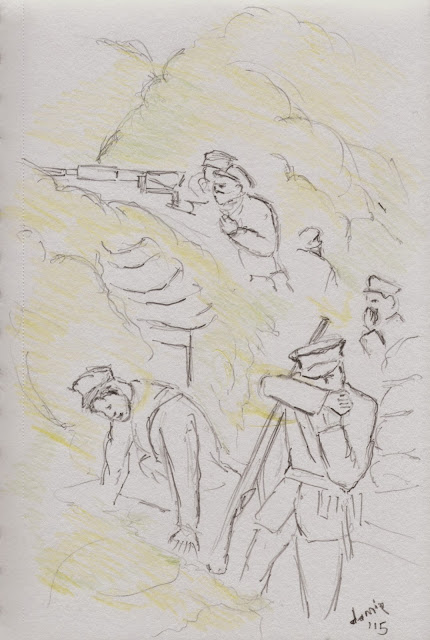While Admiring the British stance, America wished to remain neutral - but for how long?
Impression sketch of 'I Didn't Raise My Boy To Be A Soldier" 1915
sheet music cover by Jamie Mann. Note: A popular song in the United States. the original
image can be seen at: http://en.wikipedia.org/wiki/American_entry_into_World_War_I#/media/File:IDidntRaiseMyBoyToBeASoldierCoverMorton.jpeg
Mr William Shepherd had something
to say,
In the United Press of America,
for the army
Of the English - on reporting
from the British
Army Headquarters in Northern
France.
The US impression is that Tommy
Atkins,
Universal English soldier, then
equalled
By John Bull – professional Tommy
meets
non-professional John - whose
arrival as
A pre war everyday citizen, now walked
European soil, in hundreds of
thousands.
While Mr Kipling has sung plenty
about
Tommy A, John B has yet to have a
song;
The man who believes his castle is
his
Home, the very belief that took him
there.
John B is the man with a wife and
child,
Who reads newspapers, has a garden
Who talks over politics and pays his
tax.
This man who daily travels to the
office,
All of which is done in times of
peace.
It was possible to find with few
minutes,
About the headquarters, this said
man -
Equal to any readers neighbour, who
was
A clerk, a conductor, a lawyer or
fellow,
Who weeds a garden on a
summer day.
William Shepherd told how he could
find
Such a man in shade of a wooden
cross;
In a nearby field cemetery, who came
Out to do a job, which he then
finished.
Or on the street John Bull walks
about
In khaki, to be armed with
rifle or gun.
The castle is the living man's
metaphor;
For everyman's home, be they Belgium,
French or English – the home is sacred
Shelter to be protected from
enemies.
In simplistic viewpoints over
volunteers,
Shepherd states how every man jack,
Shepherd states how every man jack,
Of the hundreds and thousands,
thought
It through before walking into the
offices
Of recruitment asking for his army
place.
The thought is no American can miss
out,
On the thrill, gained in being among
the
English army – he is his own man’
man
Dressed in English Khaki, while
being
fully responsible to superiors; it
is home.
Home, where all castle homes stand
in
Jeopardy - The English John Bull
seen
As a thinker - a man who can work
out
Problems, beliefs or duty whose
answer
Is to be a fully fledged khaki
soldier.
William Shepherd warns
against John B
Of Tommy A, always singing
Tipperary,
Or ever ready for fight or
frolicking - there
Is none of this - that awaits him at
home;
John B is earnest in being there to
fight.
The music will come with the
job done.
William Shepherd found the thrill of
elbow
Against elbow with the eager
volunteer
Army of Britain - knowing there are
two
Powers in the world with such
army's;
Great Britain and the United States.
In witness to the past, long British
winter
Were seen men in Derby and silk hats,
In short and long coats, in street
shoes
And hunting boots, marching and
drilling.
Those determined faces were now
there,
Wearing caps, loyal to the Kings
Khaki.
The English army at the Front are
there
Because they wanted to be - because
Forces in themselves and
determination,
Drives them - so the audience
of American
People are told of the 1915 English
soldier.
by Jamie Mann.
Anon.,1915. America’s View of Our New Army –
Impressions at the Front. The Daily Telegraph, [online] 30 Apr. P.10. Col.3. Available at: http://www.telegraph.co.uk/news/ww1-archive/11561799/Daily-Telegraph-April-30-1915.html
[Accessed: 30 April 2015].
Mann, J., 2015. 100 years Ago - Poems by Jamie Mann. [letter] (Personal
communication, 30 April 2015).
#WW1 #WW1centenary #GreatWar #WW1poem #GreatWar #WW1centenary
#worldwarone #worldwaroneremembered #WW1America



